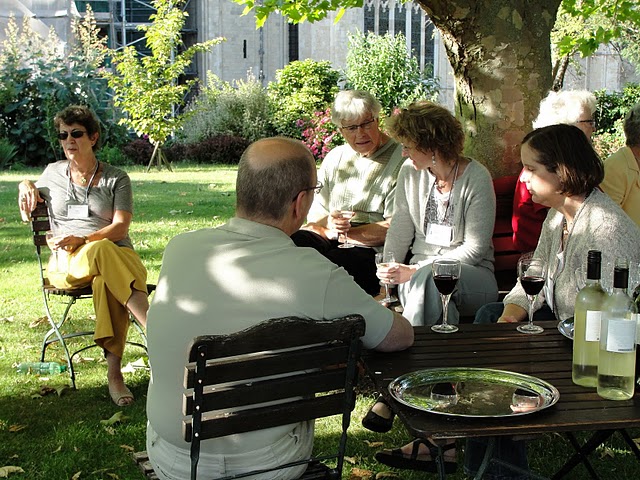The Rule of Saint BenedictThe Rule of St. Benedict is a timeless document - in so many ways as fresh and relevant as it was when it was written almost fifteen hundred years ago. Although written for monastics, many of the issues addressed in the Rule can be applied to life in the world outside the monastic community. The qualities which make up a valued life - humility, patience, simplicity, solitude, caring for others, and living in community - concern everyone. These specifics of the Rule, and the framework it provides, have great meaning for people who are seeking to live out their faith in the world today.
The Rule offers people a plan for living a balanced, simple, and prayerful life. The Rule of Benedict (RB) constitutes a basic guide for living the Christian life and continues to be followed by every Benedictine monastery and convent in the world today. Just the idea that a guide for living could not only last 1500 years, but continue to be followed by thousands of people makes its study valuable for monks and nuns as well as laypeople.
|
The Vows
In the Rule, Benedict tells his monks and nuns that a balance of prayer, work, study, and leisure (renewal) is their way, that the Divine Office is their work (opus dei), and the vows of stability, conversion, and obedience are their commitments. These vows have much to say to those of us not living in a monastery or convent:
Stability |
Stability refers to the importance of community and commitment in life. For a monk or nun it refers directly to a commitment to the monastery where they will live for the rest of their life. While we all may not be a member of a monastic order, we can make our vow of stability to our families, to our faith communities, to our local and global communities, and to our fellow pilgrims along the journey of faith. The vow of stability also speaks to our current environmental crisis—for when we remain committed to the earth we learn how to be good stewards of that which God has given us.
|
Conversion |
Conversion is not confined to a one time experience. To a monk or nun, conversion of life reminds them that everything they do is from, for, and with God and that God converts us continually. The vow tells the monastic they are to acknowledge that conversion and be open to it. For those of us not in the monastery conversion is an ongoing process as well, one that helps us walk continually in the presence of God. In order to open our ears to God’s voice and our eyes to God’s presence among us, Benedict tells us we must keep our hearts and our minds open to the ways that God is moving us. When we block the transformation that God is working within us, then we are not living into the Benedictine Way. An open heart is one that allows balanced practices of prayer, work, study, hospitality, and renewal to illuminate the ways that God is working within us and within the world.
|
Obedience |
Obedience comes from the Latin word for "listen". The practice of attentive listening is foundational to the Benedictine Rule of Life. Benedict wrote that everyone in the community needed to listen to one another, and that sometimes God speaks through the youngest person in the community. Nonetheless, it is the Abbot who needs to make the decisions in end, and each member of the community must obey him. Obedience can be a heavy word for us today. Yet a healthy, balanced view of obedience - as a way of cultivating a disciplined, intentional life that is yearning to be obedient to God - is a desire that many people in today’s world have and this makes the vow of obedience relevant. Obedience can entail a healthy sense of humility (self-knowledge) and of respecting and following the guides, leaders, teachers, and fellow travelers who are guiding you on your path towards God.
|
The Rule revolves around five practices:
Prayer, Work, Study, Hospitality and Renewal.
|
Prayer is the foundation to the monastic life and calling, and can be a constant part of the life of non-monastics as well. Benedict shows us the value of ordering our day around communal prayer (i.e. praying the Divine Office) as well as regular silent prayer/ meditation and lectio divina (prayerful reflection on Holy Scripture.)
|
Work includes not only paid employment, but also work in our faith communities, and the work we do to contribute to our family life. Benedict teaches us that all work has value and brings dignity to each human being. This is especially true as long as our work honors God by serving the community.
|
Study can include reading Holy Scripture, reading the Rule, reading wisdom writings, or studying with others in order to deepen our spiritual and intellectual lives.
|
Hospitality can include inviting the stranger into our lives as well as being hospitable to those who are already in our lives. Having a right approach to how we treat one another, and welcoming each person as Christ himself, is key to creating a healthy sense of hospitality.
|
Renewal can include the discipline of keeping a sabbath, cultivating interests that remind us of the presence of God, or taking time to notice beauty and love in our daily life. Renewal is the time to remember that our lives are still centered on the Divine, and that God is the ultimate center of our Rule of Life.
|
To learn, more:
To learn more about The Rule of St. Benedict and the Benedictine Order, visit the website of The Order of St. Benedict: www.osb.org/rb





